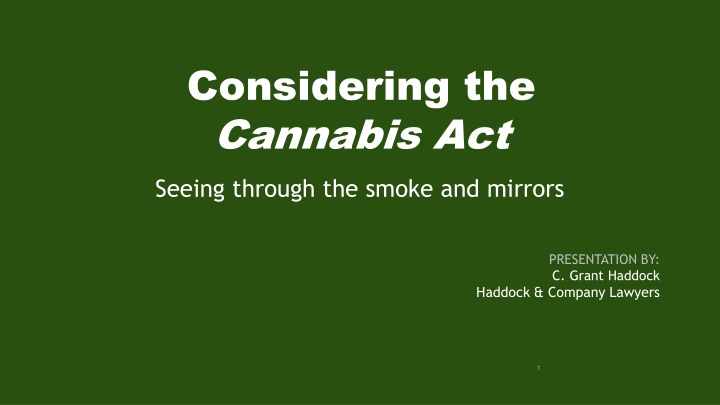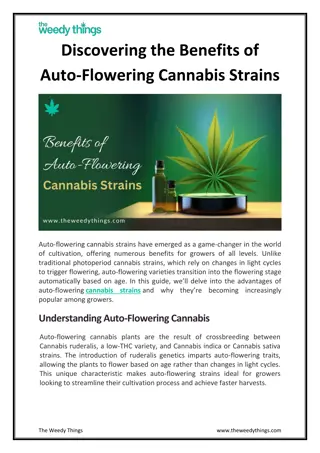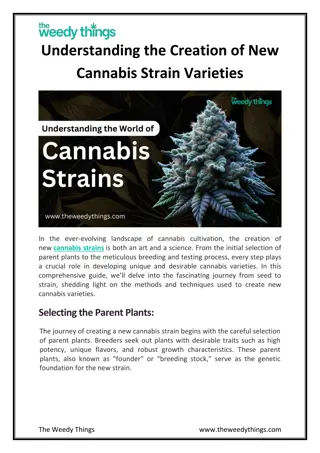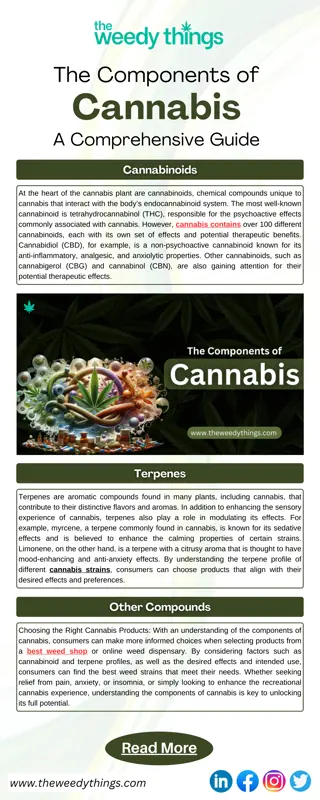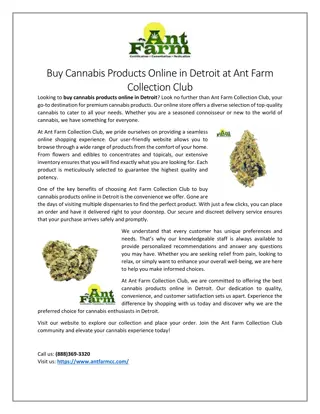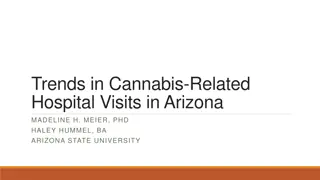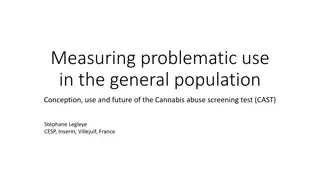Unveiling the Cannabis Act: Navigating Legalization and Regulations
"Explore the intricacies of the Cannabis Act through a comprehensive presentation covering different aspects such as legislative overview, prevention, remedies, human rights, and accommodation. Delve into the challenges and opportunities surrounding the legalization of cannabis in Canada, with a focus on protecting public health, reducing criminal activities, and legal production. Gain insights on the Controlled Drugs and Substances Act, Access to Cannabis for Medical Purposes Regulations, and the proposed Cannabis Act (Bill C-45), set to come into effect on October 17, 2018."
Download Presentation

Please find below an Image/Link to download the presentation.
The content on the website is provided AS IS for your information and personal use only. It may not be sold, licensed, or shared on other websites without obtaining consent from the author.If you encounter any issues during the download, it is possible that the publisher has removed the file from their server.
You are allowed to download the files provided on this website for personal or commercial use, subject to the condition that they are used lawfully. All files are the property of their respective owners.
The content on the website is provided AS IS for your information and personal use only. It may not be sold, licensed, or shared on other websites without obtaining consent from the author.
E N D
Presentation Transcript
Considering the Cannabis Act Seeing through the smoke and mirrors PRESENTATION BY: C. Grant Haddock Haddock & Company Lawyers 1
TODAYS PRESENTATION PART 1: Different Properties Different Problems PART 2: Legislative Overview PART 3: Prevention PART 4: Remedies PART 5: Human Rights & Accommodation Q&A s 3
Part 1 Part 1: Introductions 4
Introductions Grant Haddock Who are your members? What kind of housing do you operate? Family Townhouse Apartment style 5
Introductions Your Experience Some of you may have already struggled with balancing member needs because of access to medical cannabis. At the end of the presentation, we ll invite you to share your best practices, lessons learned and top tips. 6
Part 2 Part 2: Legislative Overview 7
Legislative Overview Current legislation: Controlled Drugs and Substances Act Exception: Access to Cannabis for Medical Purposes Regulations Proposed legislation: Cannabis Act (Bill C-45) Possession Sharing Purchasing Growing Plants Making Products 8
Legislative Overview The proposed effective date is October 17, 2018. Stated Objectives: The Government of Canada Website sets out the following objects under the Cannabis Act: Restrict youth access to cannabis Protect young people from promotion or enticements to use cannabis Deter and reduce criminal activity by imposing serious criminal penalties for those breaking the law, especially those who import, export or provide cannabis to youth 9
Legislative Overview Protect public health through strict product safety and quality requirements Reduce the burden on the criminal justice system Provide for the legal production of cannabis to reduce illegal activities Allow adults to possess and access regulated, quality controlled legal cannabis Enhance public awareness for the health risks associated with cannabis The current program for accessing cannabis for medical purposes would continue under the new Act. 10
Legislative Overview Controlled Access: When the Cannabis Act comes into force and subject to restrictions imposed by Provincial legislation, adults who are 18 years or older would be able to legally: possess up to 30 grams of legal dried cannabis or equivalent in a non-dried form; share up to 30 grams of legal cannabis with other adults; purchase dried or fresh cannabis and cannabis oil from a provincially-licensed retailer 11
Legislative Overview In those provinces that have not yet or choose not to put in place a regulated retail framework, individuals would be able to purchase cannabis online from a federally-licensed producer. grow up to 4 cannabis plants per residence for personal use from licensed seed or seedlings; make cannabis products, such as food and drinks, at home provided that organic solvents are not used. 12
Legislative Overview The British Columbia Legislation Two Acts are proposed to regulate cannabis in B.C. Cannabis Distribution Act (CDA) BC has decided that the Liquor Distribution Branch will be the wholesale distributors of non-medical cannabis in B.C. There will be both public and private retail stores. The B.C. Government will solely operate online sales. Supplies for growing can be sold at other retailers, like gardening stores. 13
Legislative Overview Cannabis Control and Licensing Act (CCLA) This Act will: Set 19 as the provincial minimum age to purchase, sell or consume cannabis; Allow adults to possess up to 30 grams of cannabis in a public place; Prohibit cannabis smoking and vaping anywhere tobacco smoking and vaping are prohibited, as well as at playgrounds, sports fields, skate parks, and other places where children commonly gather; 14
Legislative Overview Prohibit the use of cannabis on school properties and in vehicles; Authorize adults to grow up to four cannabis plants per household, but the plants must not be visible from public spaces off the property, and home cultivation will be banned in homes used as day-cares; Establish a cannabis retail licensing regime similar to the current licensing regime for liquor; Provide enforcement authority to deal with illegal sales; 15
Legislative Overview Create a number of provincial cannabis offences which may result in a fine ranging from $2,000 to $100,000, imprisonment of 3 to 12 months, or both; and Where necessary to comply with Charter Rights and human rights law, exemptions will be provided to individuals who are federally authorized to purchase, possess and consume medical cannabis. 16
Legislative Overview The CCLA also includes consequential amendments to various statutes, including: Residential Tenancy Act and Manufactured Home Park Tenancy Act to prohibit cannabis smoking under existing leases that prohibit smoking tobacco and to prohibit the personal cultivation of cannabis under existing leases, except for federally authorized medical cannabis. For new leases, the existing provisions of each Act that allow landlords and tenants to negotiate the terms of leases that will apply. No help for housing co-operatives Not really necessary as residential tenancy agreements are inflexible compared to housing co-op occupancy agreements or policies, at least in BC. 17
New Challenges for Co-operatives These are the points to consider: Legislation would allow adults to legally possess and consume regulated quantities of marijuana It would also allow them to grow up to four plants per household (In the most recent recent revision to the Bill a maximum height of one metre was scrapped). 18
New Challenges for Co-operatives It is reasonable to expect an increase in complaints and frictions between neighbours. The smell of cannabis smoke can be quite potent and can be more disruptive than that of cigarettes. 19
Industry Reaction The Canadian Federation of Apartment Owners Association has raised concerns about the production of cannabis in multiple-dwelling complexes such as condominiums and co-operatives. Some of the concerns include: Damage to units and common property, including damage by moisture from cannabis plants, which can create mould and spores in walls, ceilings and floors and which can damage window seals; A disproportionate use of utilities such as electricity and water (if not sub- metered) which are required in great quantities to grow cannabis plants. 20
Industry Reaction Increased fire hazards due to people drying cannabis in a household stove and sometimes patchy electrical modifications; Odours from plants getting into other people s units. 21
Industry Reaction Fraser Valley Real Estate Board The Fraser Valley Real Estate Board has developed a unique approach found on their website, Safe Grow Homes. Mission Statement Realtors working to ensure grow homes are safe & healthy. Recommendations: With the legalization of cannabis on the horizon, Fraser Valley Realtors want the government to provide more support, guidelines and information for 22
Industry Reaction homeowners who want to grow cannabis safely and for buyers who may want to purchase a former grow home. To protect consumers and their current or future home from any issues that can arise when growing in a residence, we urge the government to carry out these three recommendations Define Requirements Identify Illegal Growers Restoration Process 23
Industry Reaction The Insurance Industry has reacted with alarm. Growing cannabis in homes creates all sorts of risk (water, moisture, electrical) and could attract crime. Insurers may have clauses in their policies that state they will not insure properties used for the production of cannabis. 24
Industry Reaction The Banking Industry has also reacted with alarm. Grows ops or disclosure of cannabis growth at a property tends to reduce the value, thus reducing the equity protection of lender. Growing may violate the lender s mortgage terms. 25
Part 3 Part 3: Prevention 26
Prevention The rumour among co-operatives and landlords is that the Cannabis Act and CCLA grants a member the unfettered right to smoke and grow Not true! You can, subject to human rights concerns, ban smoking and growing of cannabis 27
Prevention Occupancy Agreement with smoking prohibition Consider the definition of smoking and vaping Tackling the issue of growing plants Cumbersome to amend and special resolution is required. Implementation of Policy Easier to implement as it requires a majority vote resolution at a SGM. 28
Prevention Haddock & Company Additions to the CHF BC Annotated Model Rules 2.0 7.05 Vaping COMMENT: Model Rules 2.0 were drafted, so you will not see references to vaping in older versions of the Model Rules. Vaping has exploded in popularity and Health Canada has yet to make a recommendation on whether it is good or bad for you. One thing is certain non-vapers find it annoying. Consider a vaping ban. Vaping is also a new addition in the OA. Vaping was not popular when the Notwithstanding any other provision to the Occupancy Agreement and the Rules, and in addition to the obligations, rights and remedies set out in Section 7.02: 29
Prevention [a] Vaping is prohibited: [1] [2] [3] [4] [5] [6] in a unit on the interior common areas, including but not limited to in hallways, elevators, parking garages, electrical and mechanical rooms, stairs, storage locker areas; on patios and balconies within six meters of a door, window or air intake; and within twenty-five feet of the playground area; and outdoor space designated as part of the Unit for the exclusive use of the Member. 30
Prevention [b] Vaping shall include the inhaling, exhaling, burning or ordinary use of any electrical or mechanical device to produce vapor which primary purpose to inhale or any other device that produces vapor for the primary purpose of inhaling, humidifier excluded. COMMENT: The Cannabis Control & Licensing Act regulates the use of recreational cannabis and also permits persons to grown a certain amount of plants for personal use. There are many negative factors associated with the production of cannabis and Co-ops are permitted to ban their members from cultivating cannabis. Consider a ban under this optional clause. 31
Prevention 7.06 Cannabis plants The Member shall not, nor shall the Member s family, guests or invitees grow or attempt to grow cannabis or cannabis plants as those terms are defined in Federal Cannabis Act as it is from time to time, anywhere within the Member s unit or on any common area exclusively used by the member or member s family, such as balconies and patios, not on any common area anywhere on the Development. 32
Prevention Co-op Occupancy Agreement 1.01 Breach of conditions This Occupancy Agreement and the term hereby created shall be subject to the conditions herein set forth, and shall come to an end upon withdrawal from or termination of membership. 33
Prevention 1.02 Rules The term of the Occupancy Agreement and possession of the Unit by the Member is subject to: [a] the terms and conditions set out in the Rules of the Co-op as amended from time to time; [b] relevant and applicable zoning, health, or other laws of the municipal, provincial, or federal governments; and [c] the terms and conditions of any mortgages or other agreements between the Co-op and any federal, provincial or municipal authority 34
Prevention 6.01 Comply with Rules and Policies The Member shall comply with and cause the Member's family, guests, employees and any other person occupying or visiting the Unit to comply with all the terms, conditions and provisions of this Occupancy Agreement and [a] the terms and conditions set out in the Memorandum, the Rules and the Policies of the Co-op as amended from time to time; and [b] all changes and additions to the Occupancy Agreement to the same extent as if they were herein incorporated. 35
Prevention 7.02 Good neighbour provision The Member shall not use the Unit and shall not permit any person occupying or visiting the Unit to use the Unit in any way or engage in conduct which: [a] interferes with or disturbs other members quiet or peaceful enjoyment of the Development; [b] unreasonably annoys or interferes with the other members of the Co-op by sound, conduct or other activity; [e] injures the reputation of the Co-op; or [f] in any other way breaches this Occupancy Agreement or any Policy. 36
Prevention 7.04 Smoking Notwithstanding any other provision to the Occupancy Agreement and the Rules, and in addition to the obligations, rights and remedies set out in Section 7.02: [a] Smoking is prohibited: in a Unit; on the interior common areas, including but not limited to in hallways, elevators, parking garages, electrical and mechanical rooms, stairs, storage locker areas; 1) 2) 37
Prevention on patios and balconies; within six metres of a door, window or air intake; within twenty-five metres of the playground area; and outdoor space designated as part of the Unit for the exclusive use of the Member. 3) 4) 5) 6) [b] Smoking shall include the inhaling, exhaling, burning or ordinary use of any tobacco or product whose use generates smoke. (Grandfathering clauses follow) 38
Prevention Co-op Rules 5.1 Grounds for termination of membership Where a member: [a] has engaged in conduct detrimental to the Co-op; the membership of that member may be terminated by a resolution of the Directors requiring a majority of at least three-quarters of all the Directors and passed at a meeting of the Directors called to consider the resolution. 39
Prevention Smoking does not lend itself to a breach of material condition termination because of the curative clause. 40
Creative Ways to Avoid Disturbing your Neighbour 1. Buy or make a Smoke Buddy Students in dorms have been known to make these by stuffing toilet paper roll with dryer sheets. Using an elastic band, they will put dryer sheets in both ends and exhale cannabis smoke into it. 2. ONA Cannabis growers and dispensers will Ona to neutralize smells and users can too. 41
Creative Ways to Avoid Disturbing your Neighbour Choose to vaporize and not smoke 3. This is possibly the best option for people who want to consume cannabis. Vaporizers greatly reduce the cannabis smells associated with smoking. 4. Incense/Scentsy An incense burner is an old school method of hiding pot smoking. The Scentsy burner is easily plugged in to an outlet and has many different fragrances capable of covering most bad smells including cannabis. 42
Prevention OVERVIEW Cannabis smoking is to be treated the same as cigarette smoking and dealt with as you would any other type of nuisance. 43
Part 4 Part 4: Remedies/ Recourses 44
Remedies/Recourses Let s Talk About It The goal is to keep people in housing Some members will need support in making choices that will affect others Engage with users and non-users Make a plan and start the engagement now that you have time 45
Remedies/Recourses Multiple grounds for member termination Termination for Conduct Detrimental basically a nuisance claim; Illegal activity (for now) that has, or is likely to: adversely affect the quiet enjoyment of another occupant 46
Part 5 Part 5: Human Rights & Accommodation 47
Human Rights & Accomodation Medical marijuana license automatic permission to smoke Human Rights Code- enumerated grounds of discrimination: Race, religion, colour, marital status, ancestry, family status, place of origin, age, sex, physical or mental disability, sexual orientation, gender identity or expression & lawful source of Income. Is there a nexus between the disability claimed and the remedy sought. 48
Human Rights & Accomodation The Co-op is permitted to discriminate if there is a bona fide and reasonable justification (BFRJ) (1) Legitimate housing-related purpose for the rule (2) Rule was adopted in good faith in the belief that it was necessary to accomplish the purpose (3) Rule is reasonably necessary to the purpose, such that the landlord could not accommodate the complainant without undue hardship 49
Human Rights & Accomodations Accommodation for marijuana use The Owners, Strata Plan LMS 2900 v. Mathew Hardy, 2016 CRTBC 1 Smoking vs. other methods of consumption Reasonable accommodation does not have to be perfect 50
